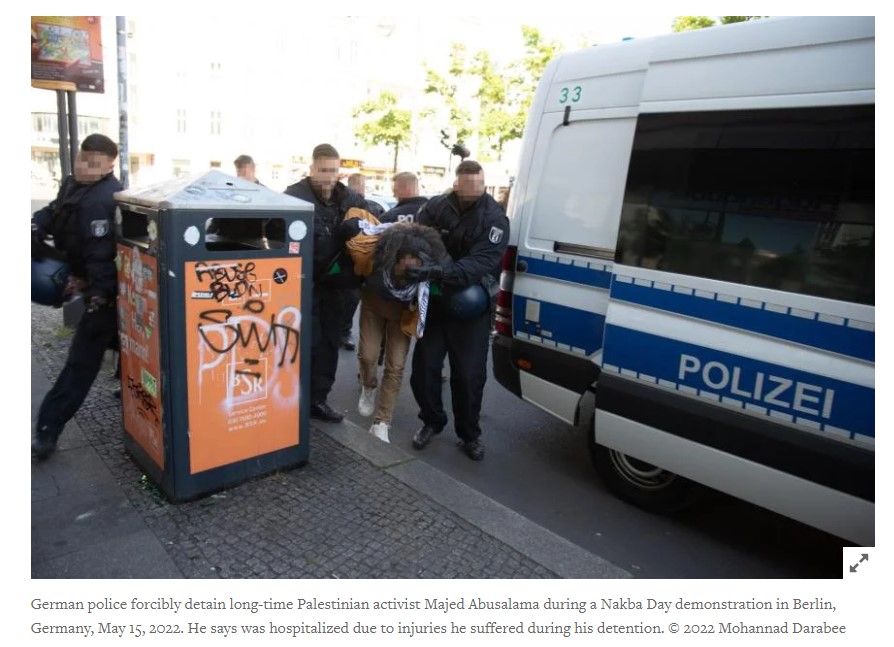Human Rights Watch: Undue Interference with Rights to Free Expression and Assembly. This week, Palestinians and their supporters across the globe marked Nakba Day, commemorating the more than 700,000 Palestinians who fled or were expelled from their homes, and the more than 400 Palestinian villages destroyed in the events surrounding the establishment of Israel in 1948.
In Berlin, however, police banned several Nakba Day protests planned for May 13-15. When people took to the streets anyway, police responded forcefully, shoving and dragging several demonstrators, and detaining scores for up to two hours, according to witnesses, lawyers, and video footage reviewed by Human Rights Watch. In one clip, an officer tells a woman she is being held because “she shouted ‘Free Palestine.’”
In one of several decisions to ban protests, the police said they assessed an “immediate danger” of “inflammatory, anti-Semitic exclamations,” incitement, and violence. A copy of the full police assessment, obtained by Human Rights Watch, cited prior protests, claiming demonstrators threw bottles and stones, carried pyrotechnics, harassed journalists, used hateful speech, denied “Israel’s right to exist,” and that protest organizers failed to maintain order.
The police highlighted the high “emotion” and considerable “mobilization potential” on Nakba Day and amid the context of escalating events in Israel and Palestine. They also noted alleged ties between demonstrations and groups they claim have links to the Popular Front for the Liberation of Palestine (PFLP) and Hamas, Palestinian political movements that are on the European Union’s list of terrorist groups.
Organizers challenged the ban, but a Berlin administrative court and a German appellate court upheld it. Courts also upheld the Berlin police’s decision to ban pro-Palestinian demonstrations that had been planned between April 29 and May 1. The police decisions follow a 2019 Bundestag resolution that wrongfully declared boycotts of Israel inherently anti-Semitic. Meanwhile, the German government too often chooses not to speak out about Israel’s grave human rights abuses against Palestinians.
International human rights law permits restrictions on the rights to free assembly, association, and expression, but restrictions should be necessary and proportionate. A preemptive ban on commemorating an event is an extreme restriction that effectively works as a collective punishment on those who wish to peacefully assemble, based on speculation over potential unlawful acts of a minority.
While law enforcement should respond to and punish acts of violence, including incitement to violence and antisemitic acts, police should seek to regulate, not ban, demonstrations. The fact that people express outrage and emotions at demonstrations should not form any part of the basis of any ban.

